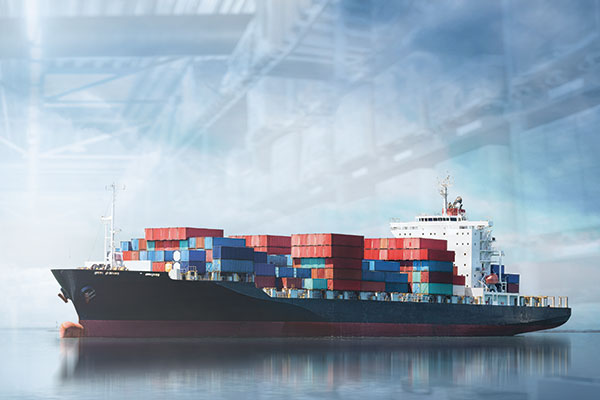We hear a lot about the sustainable value brought about by the “Slow Fashion,” and “Slow Food” movements, and now comes news that “Slow Steaming” is being recognized by environmentalists.
The Protecting Blue Whales and Blue Skies program recognized 16 global shipping companies for reducing speeds to 10 knots or less in the San Francisco Bay Area and the Southern California Region in 2020.
The voluntary program is an initiative to cut air pollution, protect endangered whales, and reduce underwater noise. The 2020 program ran from May 15, 2020 through November 15, 2020.
Awards
Three award tiers and financial incentives recognize participating companies, based on the percent of distance their fleet traveled through the Vessel Speed Reduction (VSR) zones at speeds of 10 knots or less. Credit was only given if the average speed of a transit through an entire VSR Zone did not exceed 12 knots.
“We are delighted to be able to set an industry example by voluntarily reducing vessel speeds in areas where endangered whale species regularly feed, helping us improve the way we do business, while continuing to deeply care for our environment,” said Stanley Kwiaton, MSC General Manager of Port Operations - West Coast.
MSC, Hapag-Lloyd, Yang Ming, and MOL ACE notably achieved the Sapphire tier in the large company category (greater than 30 transits) by slowing down more than 800 transits, combined. Swire Shipping achieved the Sapphire tier in the small company category (less than 30 transits). For their outstanding commitment, all five of these companies earned the Protecting Blue Whales and Blue Skies Whale Tail award.
“Biodiversity is an integral part of our sustainability strategy,” said Wolfram Guntermann, Director Regulatory Affairs & Sustainability at Hapag-Lloyd, calling the program a “remarkable initiative.”
Seven companies – COSCO Shipping Lines, Evergreen, GALI, “K” Line, Maersk, Wallenius Wilhelmsen, and Swire Shipping – generously declined their financial incentive payment. Those funds will be reinvested in the 2021 program.
The 10-knot target follows the National Oceanic and Atmospheric Administration’s (NOAA) and the United States Coast Guard’s request for all vessels (300 gross tons or larger) to slow down during the months of peak blue, humpback, and fin whale abundance to protect these endangered whales from deadly ship strikes.
Ship strikes continue to be a global threat to all large whale populations. Reducing fatal ship strikes is a major priority of NOAA’s, especially in NOAA’s West Coast national marine sanctuaries.
“One of Yang Ming’s priorities has been promoting the sustainability of the ocean and coastal environments,” said Leo Chiang, Vice President of Marine Operations. “That is why we take immense pride in being a volunteer in the Blue Whales and Blue Skies Program.”
Ocean-going vessels transiting the California coast generate nitrogen oxides (NOx, a precursor to smog), sulfur oxides (SOx), particle pollution, and greenhouse gases. These vessels account for more than 200 tons of NOx per day emitted off the coast of California, which affects ozone levels onshore in many regions of the state.
The VSR incentive program has expanded in scope and environmental benefits each year, including 2020, which marked the sixth year. The 2021 program began on May 15, 2021, and runs through November 15, 2021. Eighteen companies are currently enrolled in the 2021 program.
The Protecting Blue Whales and Blue Skies program is a collaborative effort by Santa Barbara County Air Pollution Control District; Ventura County Air Pollution Control District; Bay Area Air Quality Management District; Channel Islands, Greater Farallones, and Cordell Bank national marine sanctuaries; The Volgenau Foundation; California Marine Sanctuary Foundation; Greater Farallones Association; National Marine Sanctuary Foundation; and Environmental Defense Center.
SC
MR


Latest Supply Chain News
- How CPG brands can deliver on supplier diversity promises
- How S&OP provides the answer to in-demand products
- AI, virtual reality is bringing experiential learning into the modern age
- Humanoid robots’ place in an intralogistics smart robot strategy
- Tips for CIOs to overcome technology talent acquisition troubles
- More News
Latest Podcast

 Explore
Explore
Business Management News
- How CPG brands can deliver on supplier diversity promises
- How S&OP provides the answer to in-demand products
- AI, virtual reality is bringing experiential learning into the modern age
- Tips for CIOs to overcome technology talent acquisition troubles
- There is still work to do to achieve supply chain stability
- Blooming success: The vital role of S&OE in nurturing global supply chains
- More Business Management
Latest Business Management Resources

Subscribe

Supply Chain Management Review delivers the best industry content.

Editors’ Picks





